ENTR501: Report on Entrepreneurship and Small Business Management
VerifiedAdded on 2023/01/13
|18
|5398
|38
Report
AI Summary
This report delves into the multifaceted world of entrepreneurship and small business management. It begins by defining entrepreneurship and exploring various venture types, including small business, scalable start-up, large company, and social entrepreneurship. The report then examines the similarities and differences between these ventures, as well as the interrelation between different entrepreneurial typologies. A significant portion of the report is dedicated to evaluating the impact of micro and small businesses on the economy, highlighting their contributions to GDP growth, employment, and innovation. Furthermore, it discusses the importance of small businesses and start-ups in the social economy. The report also analyzes the characteristics, traits, and skills of successful entrepreneurs, differentiating them from traditional managers and exploring the influence of personality on entrepreneurial motivation. Finally, it considers how an entrepreneur's background and experience can either hinder or foster entrepreneurial endeavors, providing a comprehensive overview of the subject.

Entrepreneurship
And Small Business
Management
And Small Business
Management
Paraphrase This Document
Need a fresh take? Get an instant paraphrase of this document with our AI Paraphraser
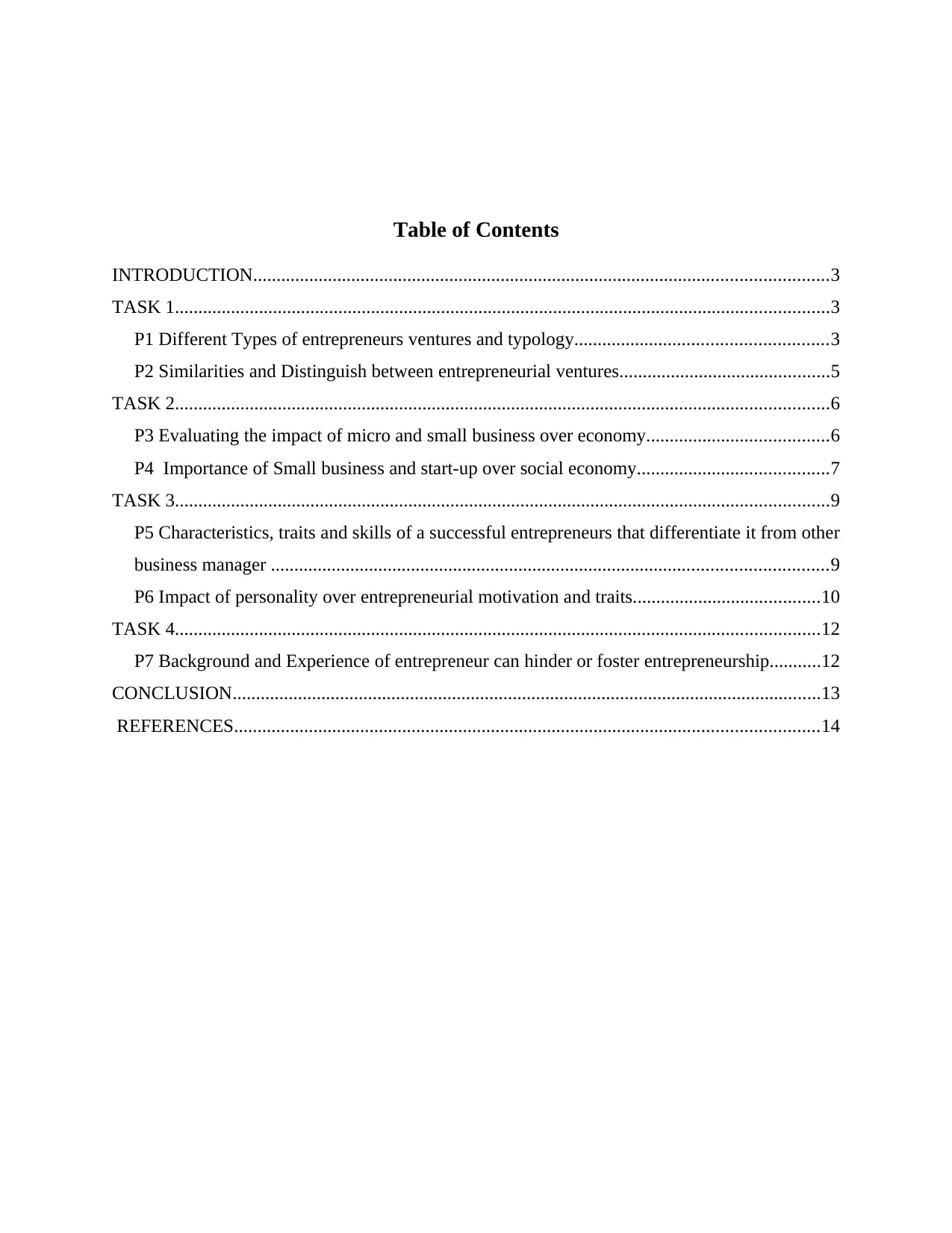
Table of Contents
INTRODUCTION...........................................................................................................................3
TASK 1............................................................................................................................................3
P1 Different Types of entrepreneurs ventures and typology......................................................3
P2 Similarities and Distinguish between entrepreneurial ventures.............................................5
TASK 2............................................................................................................................................6
P3 Evaluating the impact of micro and small business over economy.......................................6
P4 Importance of Small business and start-up over social economy.........................................7
TASK 3............................................................................................................................................9
P5 Characteristics, traits and skills of a successful entrepreneurs that differentiate it from other
business manager .......................................................................................................................9
P6 Impact of personality over entrepreneurial motivation and traits........................................10
TASK 4..........................................................................................................................................12
P7 Background and Experience of entrepreneur can hinder or foster entrepreneurship...........12
CONCLUSION..............................................................................................................................13
REFERENCES.............................................................................................................................14
INTRODUCTION...........................................................................................................................3
TASK 1............................................................................................................................................3
P1 Different Types of entrepreneurs ventures and typology......................................................3
P2 Similarities and Distinguish between entrepreneurial ventures.............................................5
TASK 2............................................................................................................................................6
P3 Evaluating the impact of micro and small business over economy.......................................6
P4 Importance of Small business and start-up over social economy.........................................7
TASK 3............................................................................................................................................9
P5 Characteristics, traits and skills of a successful entrepreneurs that differentiate it from other
business manager .......................................................................................................................9
P6 Impact of personality over entrepreneurial motivation and traits........................................10
TASK 4..........................................................................................................................................12
P7 Background and Experience of entrepreneur can hinder or foster entrepreneurship...........12
CONCLUSION..............................................................................................................................13
REFERENCES.............................................................................................................................14
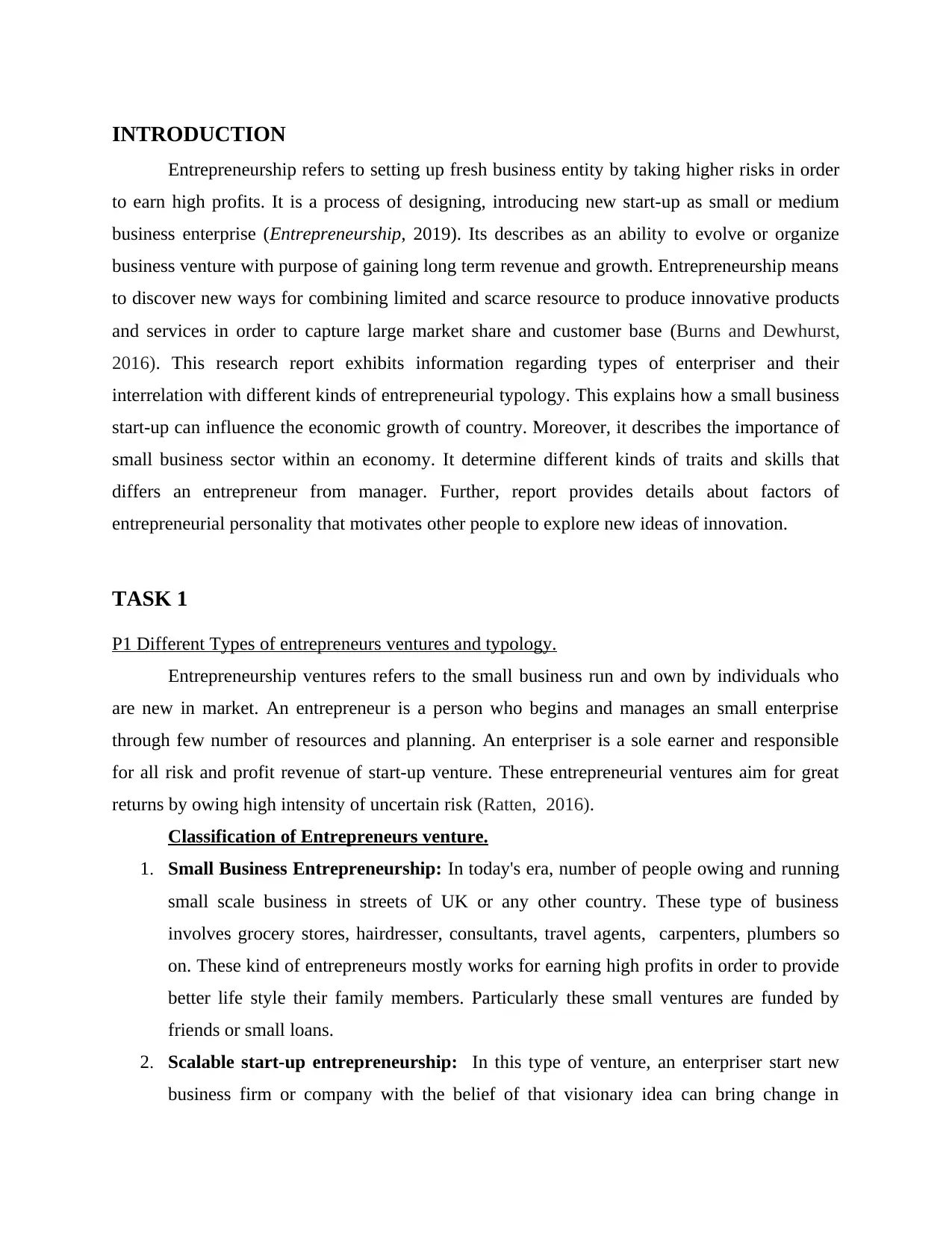
INTRODUCTION
Entrepreneurship refers to setting up fresh business entity by taking higher risks in order
to earn high profits. It is a process of designing, introducing new start-up as small or medium
business enterprise (Entrepreneurship, 2019). Its describes as an ability to evolve or organize
business venture with purpose of gaining long term revenue and growth. Entrepreneurship means
to discover new ways for combining limited and scarce resource to produce innovative products
and services in order to capture large market share and customer base (Burns and Dewhurst,
2016). This research report exhibits information regarding types of enterpriser and their
interrelation with different kinds of entrepreneurial typology. This explains how a small business
start-up can influence the economic growth of country. Moreover, it describes the importance of
small business sector within an economy. It determine different kinds of traits and skills that
differs an entrepreneur from manager. Further, report provides details about factors of
entrepreneurial personality that motivates other people to explore new ideas of innovation.
TASK 1
P1 Different Types of entrepreneurs ventures and typology.
Entrepreneurship ventures refers to the small business run and own by individuals who
are new in market. An entrepreneur is a person who begins and manages an small enterprise
through few number of resources and planning. An enterpriser is a sole earner and responsible
for all risk and profit revenue of start-up venture. These entrepreneurial ventures aim for great
returns by owing high intensity of uncertain risk (Ratten, 2016).
Classification of Entrepreneurs venture.
1. Small Business Entrepreneurship: In today's era, number of people owing and running
small scale business in streets of UK or any other country. These type of business
involves grocery stores, hairdresser, consultants, travel agents, carpenters, plumbers so
on. These kind of entrepreneurs mostly works for earning high profits in order to provide
better life style their family members. Particularly these small ventures are funded by
friends or small loans.
2. Scalable start-up entrepreneurship: In this type of venture, an enterpriser start new
business firm or company with the belief of that visionary idea can bring change in
Entrepreneurship refers to setting up fresh business entity by taking higher risks in order
to earn high profits. It is a process of designing, introducing new start-up as small or medium
business enterprise (Entrepreneurship, 2019). Its describes as an ability to evolve or organize
business venture with purpose of gaining long term revenue and growth. Entrepreneurship means
to discover new ways for combining limited and scarce resource to produce innovative products
and services in order to capture large market share and customer base (Burns and Dewhurst,
2016). This research report exhibits information regarding types of enterpriser and their
interrelation with different kinds of entrepreneurial typology. This explains how a small business
start-up can influence the economic growth of country. Moreover, it describes the importance of
small business sector within an economy. It determine different kinds of traits and skills that
differs an entrepreneur from manager. Further, report provides details about factors of
entrepreneurial personality that motivates other people to explore new ideas of innovation.
TASK 1
P1 Different Types of entrepreneurs ventures and typology.
Entrepreneurship ventures refers to the small business run and own by individuals who
are new in market. An entrepreneur is a person who begins and manages an small enterprise
through few number of resources and planning. An enterpriser is a sole earner and responsible
for all risk and profit revenue of start-up venture. These entrepreneurial ventures aim for great
returns by owing high intensity of uncertain risk (Ratten, 2016).
Classification of Entrepreneurs venture.
1. Small Business Entrepreneurship: In today's era, number of people owing and running
small scale business in streets of UK or any other country. These type of business
involves grocery stores, hairdresser, consultants, travel agents, carpenters, plumbers so
on. These kind of entrepreneurs mostly works for earning high profits in order to provide
better life style their family members. Particularly these small ventures are funded by
friends or small loans.
2. Scalable start-up entrepreneurship: In this type of venture, an enterpriser start new
business firm or company with the belief of that visionary idea can bring change in
⊘ This is a preview!⊘
Do you want full access?
Subscribe today to unlock all pages.

Trusted by 1+ million students worldwide
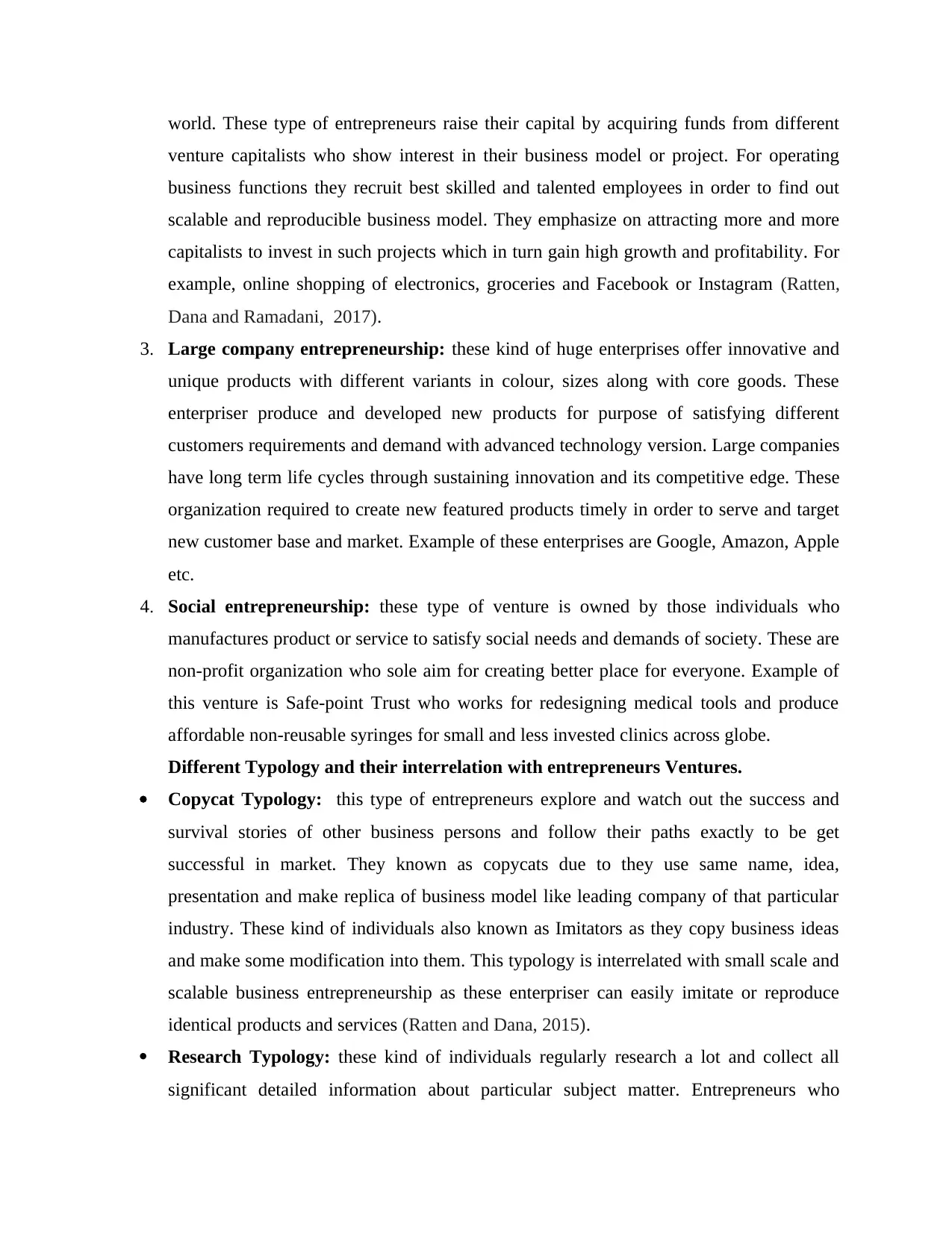
world. These type of entrepreneurs raise their capital by acquiring funds from different
venture capitalists who show interest in their business model or project. For operating
business functions they recruit best skilled and talented employees in order to find out
scalable and reproducible business model. They emphasize on attracting more and more
capitalists to invest in such projects which in turn gain high growth and profitability. For
example, online shopping of electronics, groceries and Facebook or Instagram (Ratten,
Dana and Ramadani, 2017).
3. Large company entrepreneurship: these kind of huge enterprises offer innovative and
unique products with different variants in colour, sizes along with core goods. These
enterpriser produce and developed new products for purpose of satisfying different
customers requirements and demand with advanced technology version. Large companies
have long term life cycles through sustaining innovation and its competitive edge. These
organization required to create new featured products timely in order to serve and target
new customer base and market. Example of these enterprises are Google, Amazon, Apple
etc.
4. Social entrepreneurship: these type of venture is owned by those individuals who
manufactures product or service to satisfy social needs and demands of society. These are
non-profit organization who sole aim for creating better place for everyone. Example of
this venture is Safe-point Trust who works for redesigning medical tools and produce
affordable non-reusable syringes for small and less invested clinics across globe.
Different Typology and their interrelation with entrepreneurs Ventures.
Copycat Typology: this type of entrepreneurs explore and watch out the success and
survival stories of other business persons and follow their paths exactly to be get
successful in market. They known as copycats due to they use same name, idea,
presentation and make replica of business model like leading company of that particular
industry. These kind of individuals also known as Imitators as they copy business ideas
and make some modification into them. This typology is interrelated with small scale and
scalable business entrepreneurship as these enterpriser can easily imitate or reproduce
identical products and services (Ratten and Dana, 2015).
Research Typology: these kind of individuals regularly research a lot and collect all
significant detailed information about particular subject matter. Entrepreneurs who
venture capitalists who show interest in their business model or project. For operating
business functions they recruit best skilled and talented employees in order to find out
scalable and reproducible business model. They emphasize on attracting more and more
capitalists to invest in such projects which in turn gain high growth and profitability. For
example, online shopping of electronics, groceries and Facebook or Instagram (Ratten,
Dana and Ramadani, 2017).
3. Large company entrepreneurship: these kind of huge enterprises offer innovative and
unique products with different variants in colour, sizes along with core goods. These
enterpriser produce and developed new products for purpose of satisfying different
customers requirements and demand with advanced technology version. Large companies
have long term life cycles through sustaining innovation and its competitive edge. These
organization required to create new featured products timely in order to serve and target
new customer base and market. Example of these enterprises are Google, Amazon, Apple
etc.
4. Social entrepreneurship: these type of venture is owned by those individuals who
manufactures product or service to satisfy social needs and demands of society. These are
non-profit organization who sole aim for creating better place for everyone. Example of
this venture is Safe-point Trust who works for redesigning medical tools and produce
affordable non-reusable syringes for small and less invested clinics across globe.
Different Typology and their interrelation with entrepreneurs Ventures.
Copycat Typology: this type of entrepreneurs explore and watch out the success and
survival stories of other business persons and follow their paths exactly to be get
successful in market. They known as copycats due to they use same name, idea,
presentation and make replica of business model like leading company of that particular
industry. These kind of individuals also known as Imitators as they copy business ideas
and make some modification into them. This typology is interrelated with small scale and
scalable business entrepreneurship as these enterpriser can easily imitate or reproduce
identical products and services (Ratten and Dana, 2015).
Research Typology: these kind of individuals regularly research a lot and collect all
significant detailed information about particular subject matter. Entrepreneurs who
Paraphrase This Document
Need a fresh take? Get an instant paraphrase of this document with our AI Paraphraser
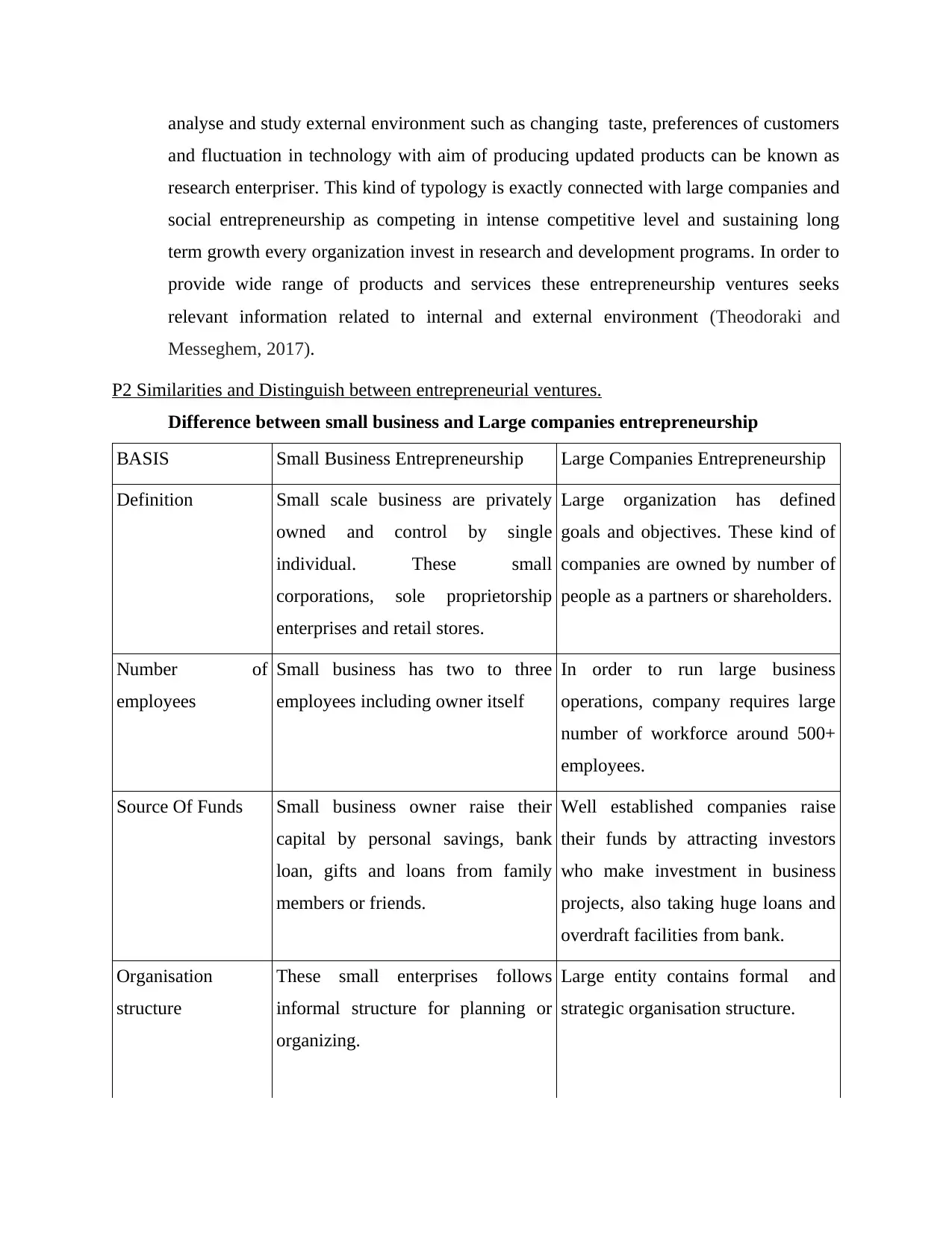
analyse and study external environment such as changing taste, preferences of customers
and fluctuation in technology with aim of producing updated products can be known as
research enterpriser. This kind of typology is exactly connected with large companies and
social entrepreneurship as competing in intense competitive level and sustaining long
term growth every organization invest in research and development programs. In order to
provide wide range of products and services these entrepreneurship ventures seeks
relevant information related to internal and external environment (Theodoraki and
Messeghem, 2017).
P2 Similarities and Distinguish between entrepreneurial ventures.
Difference between small business and Large companies entrepreneurship
BASIS Small Business Entrepreneurship Large Companies Entrepreneurship
Definition Small scale business are privately
owned and control by single
individual. These small
corporations, sole proprietorship
enterprises and retail stores.
Large organization has defined
goals and objectives. These kind of
companies are owned by number of
people as a partners or shareholders.
Number of
employees
Small business has two to three
employees including owner itself
In order to run large business
operations, company requires large
number of workforce around 500+
employees.
Source Of Funds Small business owner raise their
capital by personal savings, bank
loan, gifts and loans from family
members or friends.
Well established companies raise
their funds by attracting investors
who make investment in business
projects, also taking huge loans and
overdraft facilities from bank.
Organisation
structure
These small enterprises follows
informal structure for planning or
organizing.
Large entity contains formal and
strategic organisation structure.
and fluctuation in technology with aim of producing updated products can be known as
research enterpriser. This kind of typology is exactly connected with large companies and
social entrepreneurship as competing in intense competitive level and sustaining long
term growth every organization invest in research and development programs. In order to
provide wide range of products and services these entrepreneurship ventures seeks
relevant information related to internal and external environment (Theodoraki and
Messeghem, 2017).
P2 Similarities and Distinguish between entrepreneurial ventures.
Difference between small business and Large companies entrepreneurship
BASIS Small Business Entrepreneurship Large Companies Entrepreneurship
Definition Small scale business are privately
owned and control by single
individual. These small
corporations, sole proprietorship
enterprises and retail stores.
Large organization has defined
goals and objectives. These kind of
companies are owned by number of
people as a partners or shareholders.
Number of
employees
Small business has two to three
employees including owner itself
In order to run large business
operations, company requires large
number of workforce around 500+
employees.
Source Of Funds Small business owner raise their
capital by personal savings, bank
loan, gifts and loans from family
members or friends.
Well established companies raise
their funds by attracting investors
who make investment in business
projects, also taking huge loans and
overdraft facilities from bank.
Organisation
structure
These small enterprises follows
informal structure for planning or
organizing.
Large entity contains formal and
strategic organisation structure.
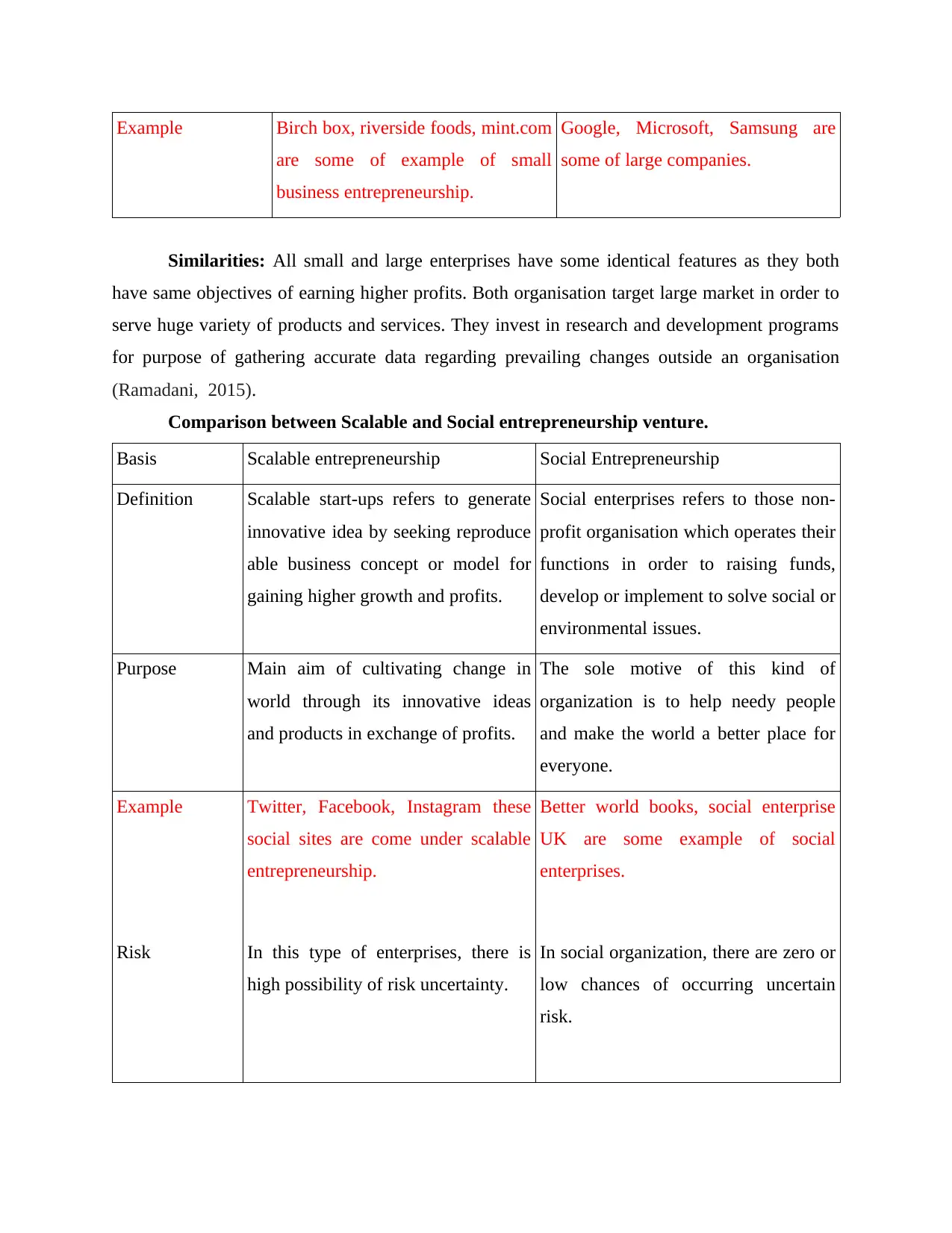
Example Birch box, riverside foods, mint.com
are some of example of small
business entrepreneurship.
Google, Microsoft, Samsung are
some of large companies.
Similarities: All small and large enterprises have some identical features as they both
have same objectives of earning higher profits. Both organisation target large market in order to
serve huge variety of products and services. They invest in research and development programs
for purpose of gathering accurate data regarding prevailing changes outside an organisation
(Ramadani, 2015).
Comparison between Scalable and Social entrepreneurship venture.
Basis Scalable entrepreneurship Social Entrepreneurship
Definition Scalable start-ups refers to generate
innovative idea by seeking reproduce
able business concept or model for
gaining higher growth and profits.
Social enterprises refers to those non-
profit organisation which operates their
functions in order to raising funds,
develop or implement to solve social or
environmental issues.
Purpose Main aim of cultivating change in
world through its innovative ideas
and products in exchange of profits.
The sole motive of this kind of
organization is to help needy people
and make the world a better place for
everyone.
Example Twitter, Facebook, Instagram these
social sites are come under scalable
entrepreneurship.
Better world books, social enterprise
UK are some example of social
enterprises.
Risk In this type of enterprises, there is
high possibility of risk uncertainty.
In social organization, there are zero or
low chances of occurring uncertain
risk.
are some of example of small
business entrepreneurship.
Google, Microsoft, Samsung are
some of large companies.
Similarities: All small and large enterprises have some identical features as they both
have same objectives of earning higher profits. Both organisation target large market in order to
serve huge variety of products and services. They invest in research and development programs
for purpose of gathering accurate data regarding prevailing changes outside an organisation
(Ramadani, 2015).
Comparison between Scalable and Social entrepreneurship venture.
Basis Scalable entrepreneurship Social Entrepreneurship
Definition Scalable start-ups refers to generate
innovative idea by seeking reproduce
able business concept or model for
gaining higher growth and profits.
Social enterprises refers to those non-
profit organisation which operates their
functions in order to raising funds,
develop or implement to solve social or
environmental issues.
Purpose Main aim of cultivating change in
world through its innovative ideas
and products in exchange of profits.
The sole motive of this kind of
organization is to help needy people
and make the world a better place for
everyone.
Example Twitter, Facebook, Instagram these
social sites are come under scalable
entrepreneurship.
Better world books, social enterprise
UK are some example of social
enterprises.
Risk In this type of enterprises, there is
high possibility of risk uncertainty.
In social organization, there are zero or
low chances of occurring uncertain
risk.
⊘ This is a preview!⊘
Do you want full access?
Subscribe today to unlock all pages.

Trusted by 1+ million students worldwide
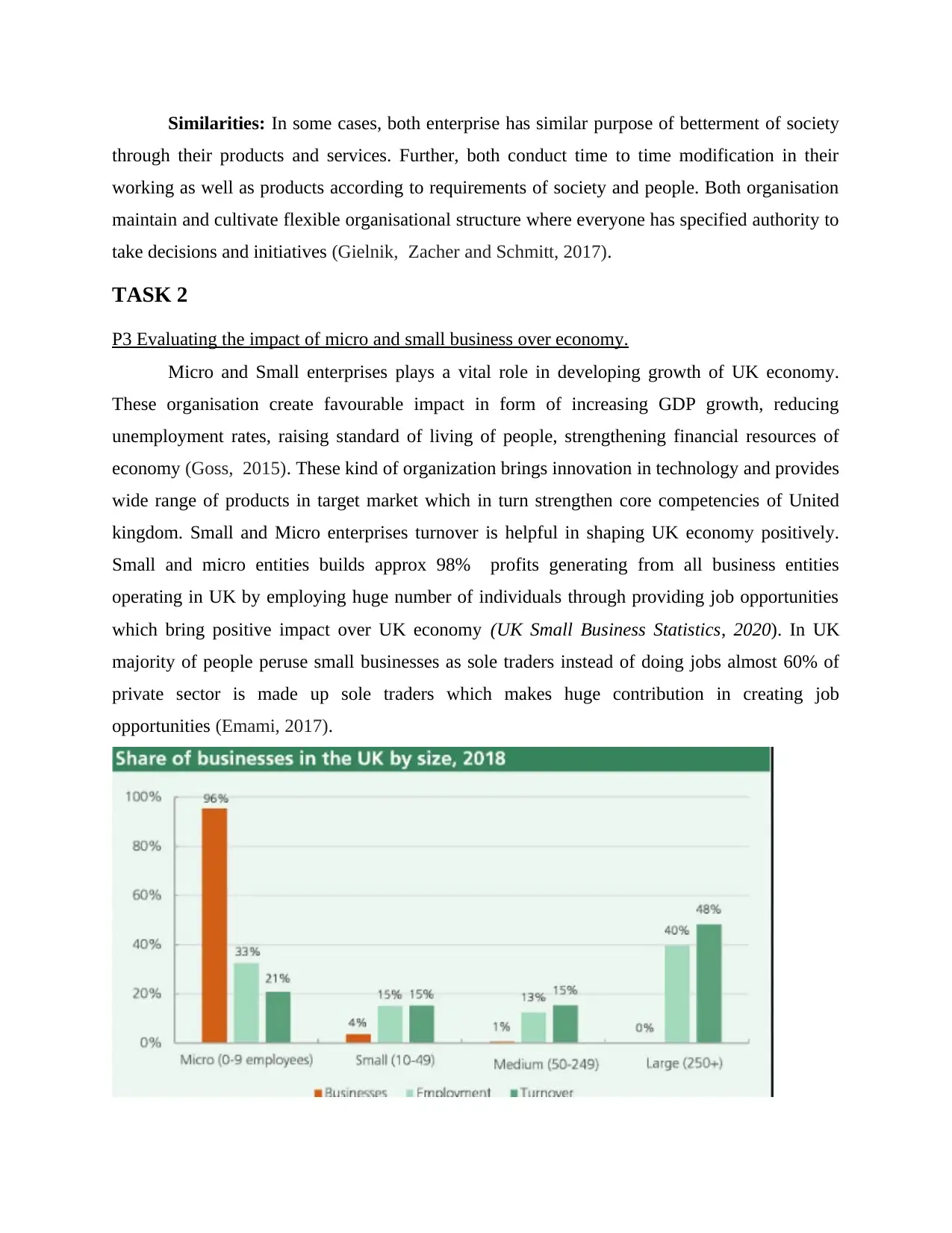
Similarities: In some cases, both enterprise has similar purpose of betterment of society
through their products and services. Further, both conduct time to time modification in their
working as well as products according to requirements of society and people. Both organisation
maintain and cultivate flexible organisational structure where everyone has specified authority to
take decisions and initiatives (Gielnik, Zacher and Schmitt, 2017).
TASK 2
P3 Evaluating the impact of micro and small business over economy.
Micro and Small enterprises plays a vital role in developing growth of UK economy.
These organisation create favourable impact in form of increasing GDP growth, reducing
unemployment rates, raising standard of living of people, strengthening financial resources of
economy (Goss, 2015). These kind of organization brings innovation in technology and provides
wide range of products in target market which in turn strengthen core competencies of United
kingdom. Small and Micro enterprises turnover is helpful in shaping UK economy positively.
Small and micro entities builds approx 98% profits generating from all business entities
operating in UK by employing huge number of individuals through providing job opportunities
which bring positive impact over UK economy (UK Small Business Statistics, 2020). In UK
majority of people peruse small businesses as sole traders instead of doing jobs almost 60% of
private sector is made up sole traders which makes huge contribution in creating job
opportunities (Emami, 2017).
through their products and services. Further, both conduct time to time modification in their
working as well as products according to requirements of society and people. Both organisation
maintain and cultivate flexible organisational structure where everyone has specified authority to
take decisions and initiatives (Gielnik, Zacher and Schmitt, 2017).
TASK 2
P3 Evaluating the impact of micro and small business over economy.
Micro and Small enterprises plays a vital role in developing growth of UK economy.
These organisation create favourable impact in form of increasing GDP growth, reducing
unemployment rates, raising standard of living of people, strengthening financial resources of
economy (Goss, 2015). These kind of organization brings innovation in technology and provides
wide range of products in target market which in turn strengthen core competencies of United
kingdom. Small and Micro enterprises turnover is helpful in shaping UK economy positively.
Small and micro entities builds approx 98% profits generating from all business entities
operating in UK by employing huge number of individuals through providing job opportunities
which bring positive impact over UK economy (UK Small Business Statistics, 2020). In UK
majority of people peruse small businesses as sole traders instead of doing jobs almost 60% of
private sector is made up sole traders which makes huge contribution in creating job
opportunities (Emami, 2017).
Paraphrase This Document
Need a fresh take? Get an instant paraphrase of this document with our AI Paraphraser
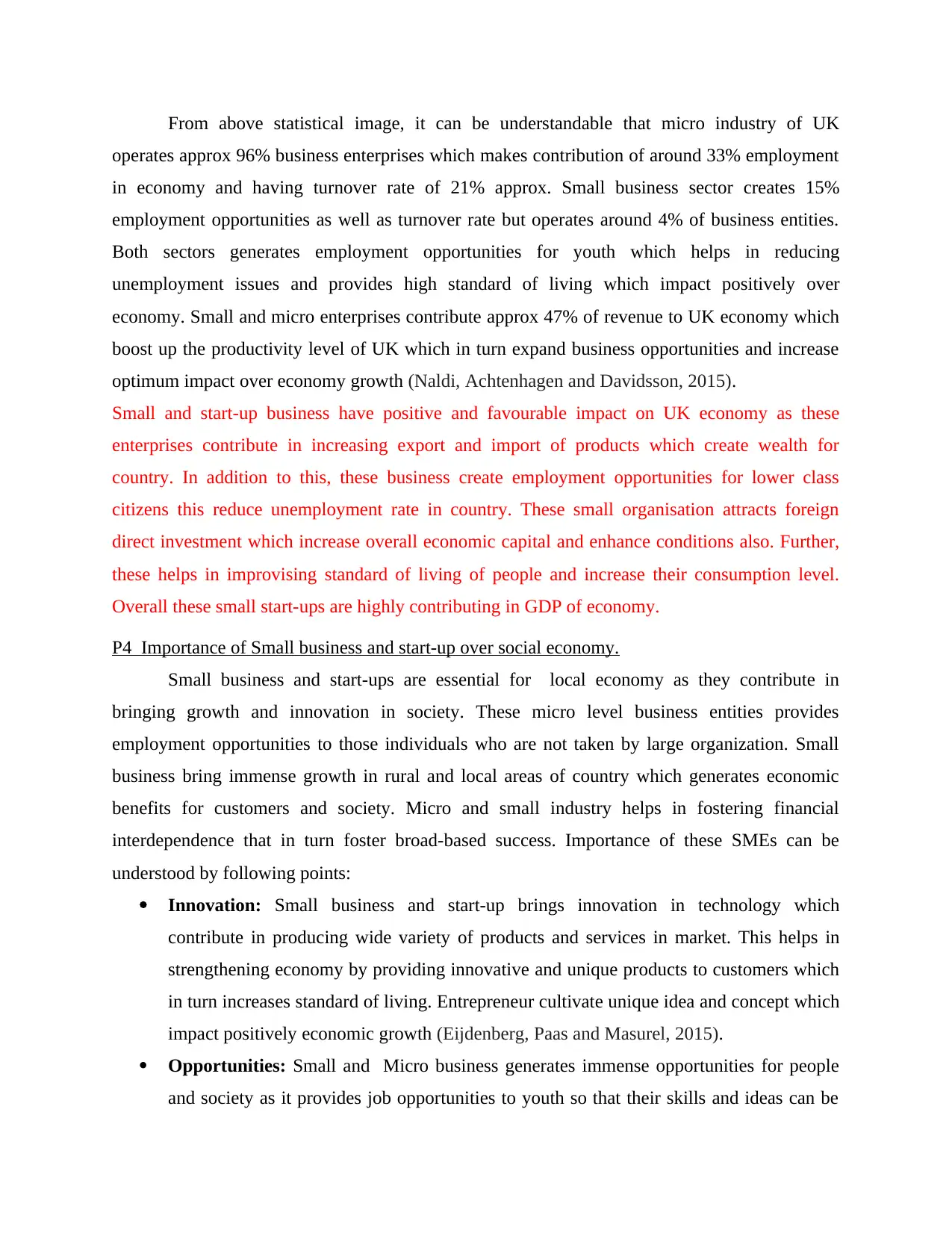
From above statistical image, it can be understandable that micro industry of UK
operates approx 96% business enterprises which makes contribution of around 33% employment
in economy and having turnover rate of 21% approx. Small business sector creates 15%
employment opportunities as well as turnover rate but operates around 4% of business entities.
Both sectors generates employment opportunities for youth which helps in reducing
unemployment issues and provides high standard of living which impact positively over
economy. Small and micro enterprises contribute approx 47% of revenue to UK economy which
boost up the productivity level of UK which in turn expand business opportunities and increase
optimum impact over economy growth (Naldi, Achtenhagen and Davidsson, 2015).
Small and start-up business have positive and favourable impact on UK economy as these
enterprises contribute in increasing export and import of products which create wealth for
country. In addition to this, these business create employment opportunities for lower class
citizens this reduce unemployment rate in country. These small organisation attracts foreign
direct investment which increase overall economic capital and enhance conditions also. Further,
these helps in improvising standard of living of people and increase their consumption level.
Overall these small start-ups are highly contributing in GDP of economy.
P4 Importance of Small business and start-up over social economy.
Small business and start-ups are essential for local economy as they contribute in
bringing growth and innovation in society. These micro level business entities provides
employment opportunities to those individuals who are not taken by large organization. Small
business bring immense growth in rural and local areas of country which generates economic
benefits for customers and society. Micro and small industry helps in fostering financial
interdependence that in turn foster broad-based success. Importance of these SMEs can be
understood by following points:
Innovation: Small business and start-up brings innovation in technology which
contribute in producing wide variety of products and services in market. This helps in
strengthening economy by providing innovative and unique products to customers which
in turn increases standard of living. Entrepreneur cultivate unique idea and concept which
impact positively economic growth (Eijdenberg, Paas and Masurel, 2015).
Opportunities: Small and Micro business generates immense opportunities for people
and society as it provides job opportunities to youth so that their skills and ideas can be
operates approx 96% business enterprises which makes contribution of around 33% employment
in economy and having turnover rate of 21% approx. Small business sector creates 15%
employment opportunities as well as turnover rate but operates around 4% of business entities.
Both sectors generates employment opportunities for youth which helps in reducing
unemployment issues and provides high standard of living which impact positively over
economy. Small and micro enterprises contribute approx 47% of revenue to UK economy which
boost up the productivity level of UK which in turn expand business opportunities and increase
optimum impact over economy growth (Naldi, Achtenhagen and Davidsson, 2015).
Small and start-up business have positive and favourable impact on UK economy as these
enterprises contribute in increasing export and import of products which create wealth for
country. In addition to this, these business create employment opportunities for lower class
citizens this reduce unemployment rate in country. These small organisation attracts foreign
direct investment which increase overall economic capital and enhance conditions also. Further,
these helps in improvising standard of living of people and increase their consumption level.
Overall these small start-ups are highly contributing in GDP of economy.
P4 Importance of Small business and start-up over social economy.
Small business and start-ups are essential for local economy as they contribute in
bringing growth and innovation in society. These micro level business entities provides
employment opportunities to those individuals who are not taken by large organization. Small
business bring immense growth in rural and local areas of country which generates economic
benefits for customers and society. Micro and small industry helps in fostering financial
interdependence that in turn foster broad-based success. Importance of these SMEs can be
understood by following points:
Innovation: Small business and start-up brings innovation in technology which
contribute in producing wide variety of products and services in market. This helps in
strengthening economy by providing innovative and unique products to customers which
in turn increases standard of living. Entrepreneur cultivate unique idea and concept which
impact positively economic growth (Eijdenberg, Paas and Masurel, 2015).
Opportunities: Small and Micro business generates immense opportunities for people
and society as it provides job opportunities to youth so that their skills and ideas can be
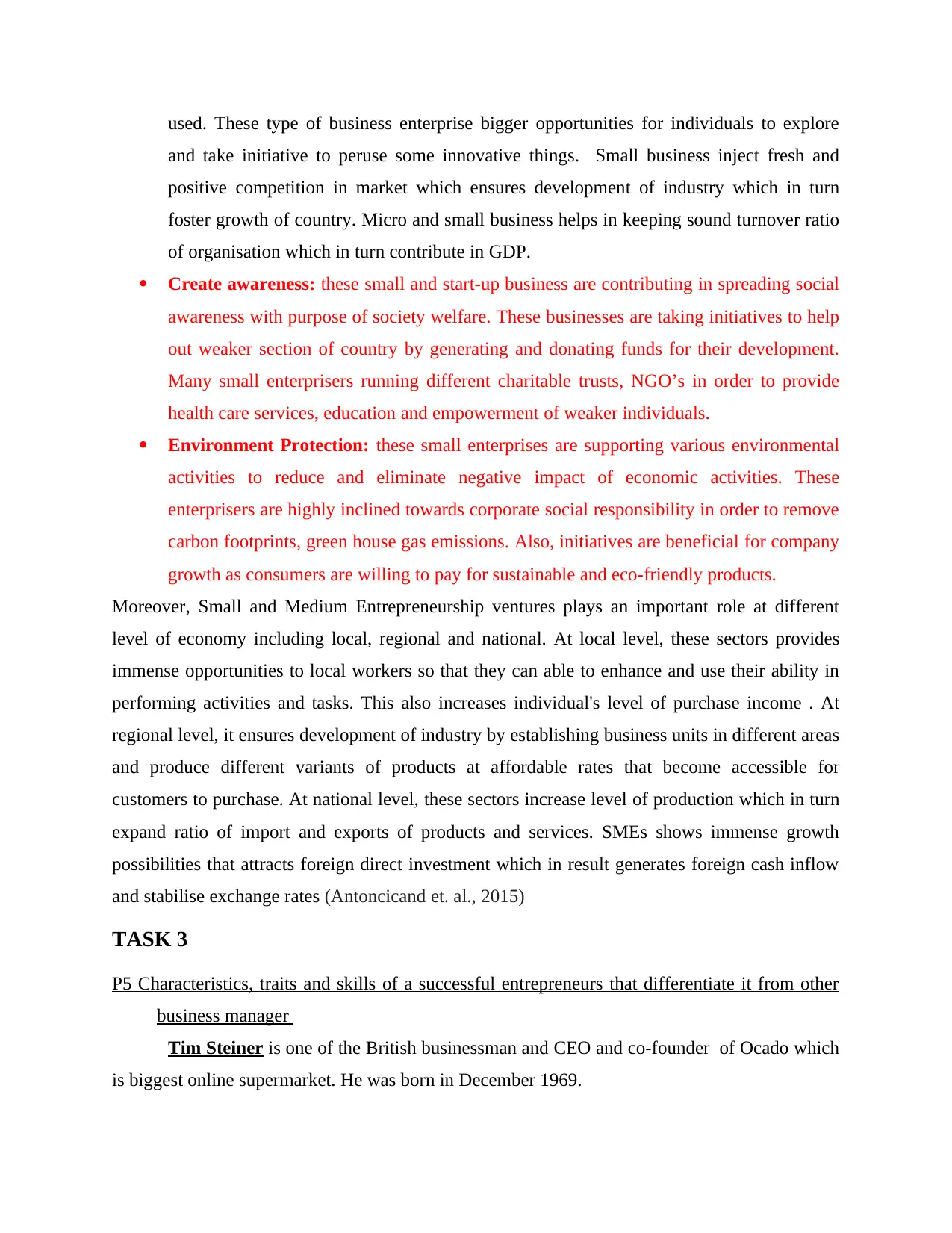
used. These type of business enterprise bigger opportunities for individuals to explore
and take initiative to peruse some innovative things. Small business inject fresh and
positive competition in market which ensures development of industry which in turn
foster growth of country. Micro and small business helps in keeping sound turnover ratio
of organisation which in turn contribute in GDP.
Create awareness: these small and start-up business are contributing in spreading social
awareness with purpose of society welfare. These businesses are taking initiatives to help
out weaker section of country by generating and donating funds for their development.
Many small enterprisers running different charitable trusts, NGO’s in order to provide
health care services, education and empowerment of weaker individuals.
Environment Protection: these small enterprises are supporting various environmental
activities to reduce and eliminate negative impact of economic activities. These
enterprisers are highly inclined towards corporate social responsibility in order to remove
carbon footprints, green house gas emissions. Also, initiatives are beneficial for company
growth as consumers are willing to pay for sustainable and eco-friendly products.
Moreover, Small and Medium Entrepreneurship ventures plays an important role at different
level of economy including local, regional and national. At local level, these sectors provides
immense opportunities to local workers so that they can able to enhance and use their ability in
performing activities and tasks. This also increases individual's level of purchase income . At
regional level, it ensures development of industry by establishing business units in different areas
and produce different variants of products at affordable rates that become accessible for
customers to purchase. At national level, these sectors increase level of production which in turn
expand ratio of import and exports of products and services. SMEs shows immense growth
possibilities that attracts foreign direct investment which in result generates foreign cash inflow
and stabilise exchange rates (Antoncicand et. al., 2015)
TASK 3
P5 Characteristics, traits and skills of a successful entrepreneurs that differentiate it from other
business manager
Tim Steiner is one of the British businessman and CEO and co-founder of Ocado which
is biggest online supermarket. He was born in December 1969.
and take initiative to peruse some innovative things. Small business inject fresh and
positive competition in market which ensures development of industry which in turn
foster growth of country. Micro and small business helps in keeping sound turnover ratio
of organisation which in turn contribute in GDP.
Create awareness: these small and start-up business are contributing in spreading social
awareness with purpose of society welfare. These businesses are taking initiatives to help
out weaker section of country by generating and donating funds for their development.
Many small enterprisers running different charitable trusts, NGO’s in order to provide
health care services, education and empowerment of weaker individuals.
Environment Protection: these small enterprises are supporting various environmental
activities to reduce and eliminate negative impact of economic activities. These
enterprisers are highly inclined towards corporate social responsibility in order to remove
carbon footprints, green house gas emissions. Also, initiatives are beneficial for company
growth as consumers are willing to pay for sustainable and eco-friendly products.
Moreover, Small and Medium Entrepreneurship ventures plays an important role at different
level of economy including local, regional and national. At local level, these sectors provides
immense opportunities to local workers so that they can able to enhance and use their ability in
performing activities and tasks. This also increases individual's level of purchase income . At
regional level, it ensures development of industry by establishing business units in different areas
and produce different variants of products at affordable rates that become accessible for
customers to purchase. At national level, these sectors increase level of production which in turn
expand ratio of import and exports of products and services. SMEs shows immense growth
possibilities that attracts foreign direct investment which in result generates foreign cash inflow
and stabilise exchange rates (Antoncicand et. al., 2015)
TASK 3
P5 Characteristics, traits and skills of a successful entrepreneurs that differentiate it from other
business manager
Tim Steiner is one of the British businessman and CEO and co-founder of Ocado which
is biggest online supermarket. He was born in December 1969.
⊘ This is a preview!⊘
Do you want full access?
Subscribe today to unlock all pages.

Trusted by 1+ million students worldwide
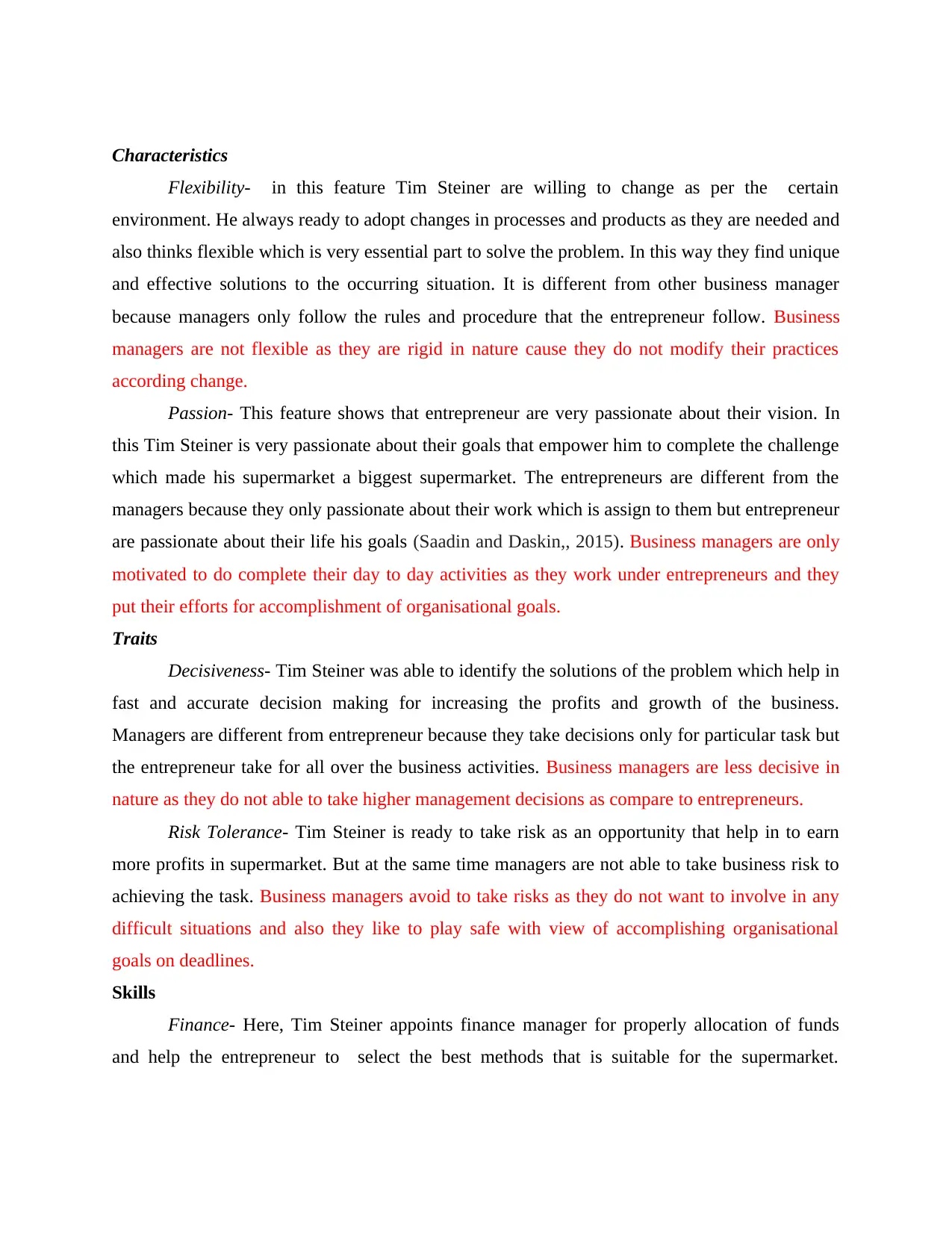
Characteristics
Flexibility- in this feature Tim Steiner are willing to change as per the certain
environment. He always ready to adopt changes in processes and products as they are needed and
also thinks flexible which is very essential part to solve the problem. In this way they find unique
and effective solutions to the occurring situation. It is different from other business manager
because managers only follow the rules and procedure that the entrepreneur follow. Business
managers are not flexible as they are rigid in nature cause they do not modify their practices
according change.
Passion- This feature shows that entrepreneur are very passionate about their vision. In
this Tim Steiner is very passionate about their goals that empower him to complete the challenge
which made his supermarket a biggest supermarket. The entrepreneurs are different from the
managers because they only passionate about their work which is assign to them but entrepreneur
are passionate about their life his goals (Saadin and Daskin,, 2015). Business managers are only
motivated to do complete their day to day activities as they work under entrepreneurs and they
put their efforts for accomplishment of organisational goals.
Traits
Decisiveness- Tim Steiner was able to identify the solutions of the problem which help in
fast and accurate decision making for increasing the profits and growth of the business.
Managers are different from entrepreneur because they take decisions only for particular task but
the entrepreneur take for all over the business activities. Business managers are less decisive in
nature as they do not able to take higher management decisions as compare to entrepreneurs.
Risk Tolerance- Tim Steiner is ready to take risk as an opportunity that help in to earn
more profits in supermarket. But at the same time managers are not able to take business risk to
achieving the task. Business managers avoid to take risks as they do not want to involve in any
difficult situations and also they like to play safe with view of accomplishing organisational
goals on deadlines.
Skills
Finance- Here, Tim Steiner appoints finance manager for properly allocation of funds
and help the entrepreneur to select the best methods that is suitable for the supermarket.
Flexibility- in this feature Tim Steiner are willing to change as per the certain
environment. He always ready to adopt changes in processes and products as they are needed and
also thinks flexible which is very essential part to solve the problem. In this way they find unique
and effective solutions to the occurring situation. It is different from other business manager
because managers only follow the rules and procedure that the entrepreneur follow. Business
managers are not flexible as they are rigid in nature cause they do not modify their practices
according change.
Passion- This feature shows that entrepreneur are very passionate about their vision. In
this Tim Steiner is very passionate about their goals that empower him to complete the challenge
which made his supermarket a biggest supermarket. The entrepreneurs are different from the
managers because they only passionate about their work which is assign to them but entrepreneur
are passionate about their life his goals (Saadin and Daskin,, 2015). Business managers are only
motivated to do complete their day to day activities as they work under entrepreneurs and they
put their efforts for accomplishment of organisational goals.
Traits
Decisiveness- Tim Steiner was able to identify the solutions of the problem which help in
fast and accurate decision making for increasing the profits and growth of the business.
Managers are different from entrepreneur because they take decisions only for particular task but
the entrepreneur take for all over the business activities. Business managers are less decisive in
nature as they do not able to take higher management decisions as compare to entrepreneurs.
Risk Tolerance- Tim Steiner is ready to take risk as an opportunity that help in to earn
more profits in supermarket. But at the same time managers are not able to take business risk to
achieving the task. Business managers avoid to take risks as they do not want to involve in any
difficult situations and also they like to play safe with view of accomplishing organisational
goals on deadlines.
Skills
Finance- Here, Tim Steiner appoints finance manager for properly allocation of funds
and help the entrepreneur to select the best methods that is suitable for the supermarket.
Paraphrase This Document
Need a fresh take? Get an instant paraphrase of this document with our AI Paraphraser
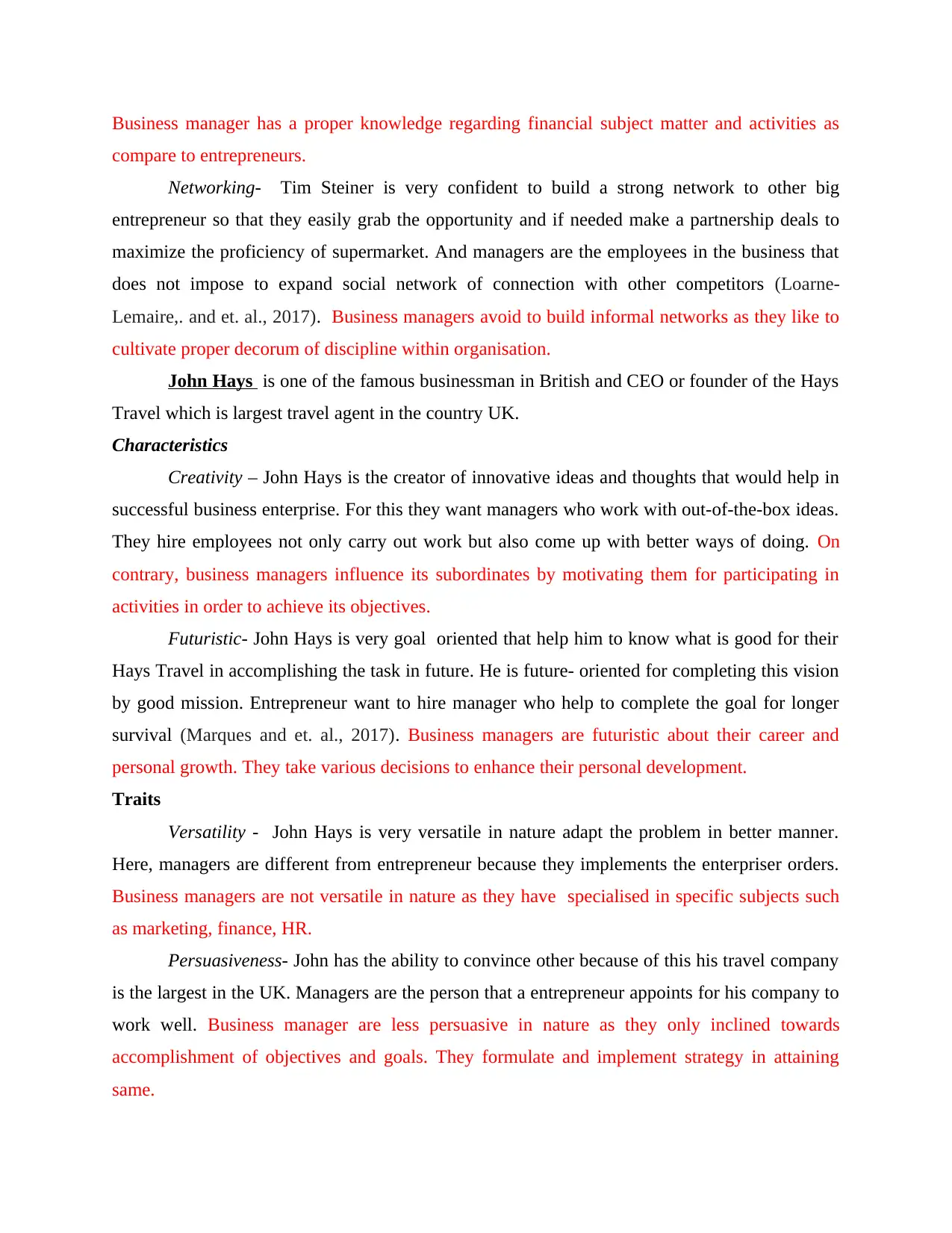
Business manager has a proper knowledge regarding financial subject matter and activities as
compare to entrepreneurs.
Networking- Tim Steiner is very confident to build a strong network to other big
entrepreneur so that they easily grab the opportunity and if needed make a partnership deals to
maximize the proficiency of supermarket. And managers are the employees in the business that
does not impose to expand social network of connection with other competitors (Loarne-
Lemaire,. and et. al., 2017). Business managers avoid to build informal networks as they like to
cultivate proper decorum of discipline within organisation.
John Hays is one of the famous businessman in British and CEO or founder of the Hays
Travel which is largest travel agent in the country UK.
Characteristics
Creativity – John Hays is the creator of innovative ideas and thoughts that would help in
successful business enterprise. For this they want managers who work with out-of-the-box ideas.
They hire employees not only carry out work but also come up with better ways of doing. On
contrary, business managers influence its subordinates by motivating them for participating in
activities in order to achieve its objectives.
Futuristic- John Hays is very goal oriented that help him to know what is good for their
Hays Travel in accomplishing the task in future. He is future- oriented for completing this vision
by good mission. Entrepreneur want to hire manager who help to complete the goal for longer
survival (Marques and et. al., 2017). Business managers are futuristic about their career and
personal growth. They take various decisions to enhance their personal development.
Traits
Versatility - John Hays is very versatile in nature adapt the problem in better manner.
Here, managers are different from entrepreneur because they implements the enterpriser orders.
Business managers are not versatile in nature as they have specialised in specific subjects such
as marketing, finance, HR.
Persuasiveness- John has the ability to convince other because of this his travel company
is the largest in the UK. Managers are the person that a entrepreneur appoints for his company to
work well. Business manager are less persuasive in nature as they only inclined towards
accomplishment of objectives and goals. They formulate and implement strategy in attaining
same.
compare to entrepreneurs.
Networking- Tim Steiner is very confident to build a strong network to other big
entrepreneur so that they easily grab the opportunity and if needed make a partnership deals to
maximize the proficiency of supermarket. And managers are the employees in the business that
does not impose to expand social network of connection with other competitors (Loarne-
Lemaire,. and et. al., 2017). Business managers avoid to build informal networks as they like to
cultivate proper decorum of discipline within organisation.
John Hays is one of the famous businessman in British and CEO or founder of the Hays
Travel which is largest travel agent in the country UK.
Characteristics
Creativity – John Hays is the creator of innovative ideas and thoughts that would help in
successful business enterprise. For this they want managers who work with out-of-the-box ideas.
They hire employees not only carry out work but also come up with better ways of doing. On
contrary, business managers influence its subordinates by motivating them for participating in
activities in order to achieve its objectives.
Futuristic- John Hays is very goal oriented that help him to know what is good for their
Hays Travel in accomplishing the task in future. He is future- oriented for completing this vision
by good mission. Entrepreneur want to hire manager who help to complete the goal for longer
survival (Marques and et. al., 2017). Business managers are futuristic about their career and
personal growth. They take various decisions to enhance their personal development.
Traits
Versatility - John Hays is very versatile in nature adapt the problem in better manner.
Here, managers are different from entrepreneur because they implements the enterpriser orders.
Business managers are not versatile in nature as they have specialised in specific subjects such
as marketing, finance, HR.
Persuasiveness- John has the ability to convince other because of this his travel company
is the largest in the UK. Managers are the person that a entrepreneur appoints for his company to
work well. Business manager are less persuasive in nature as they only inclined towards
accomplishment of objectives and goals. They formulate and implement strategy in attaining
same.
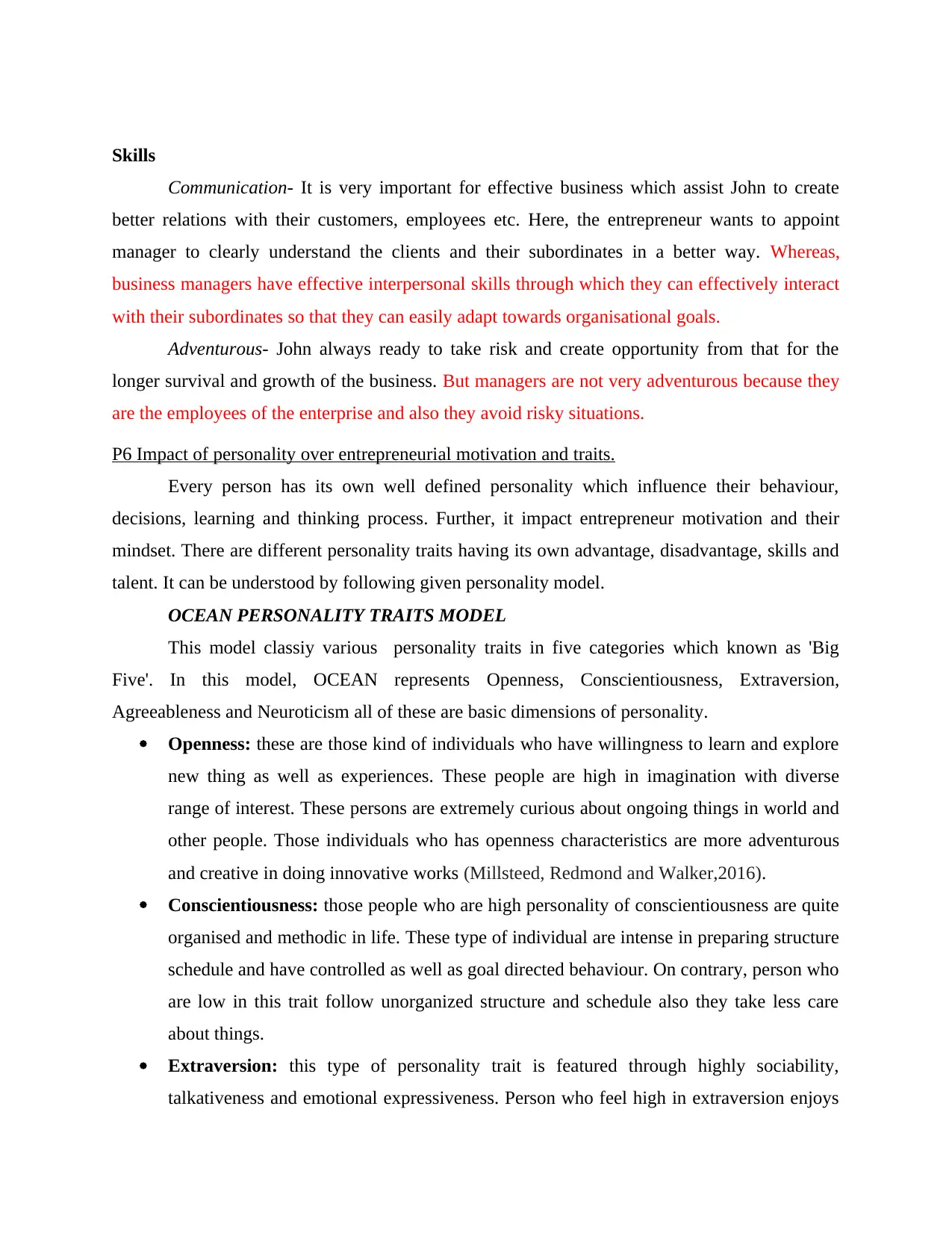
Skills
Communication- It is very important for effective business which assist John to create
better relations with their customers, employees etc. Here, the entrepreneur wants to appoint
manager to clearly understand the clients and their subordinates in a better way. Whereas,
business managers have effective interpersonal skills through which they can effectively interact
with their subordinates so that they can easily adapt towards organisational goals.
Adventurous- John always ready to take risk and create opportunity from that for the
longer survival and growth of the business. But managers are not very adventurous because they
are the employees of the enterprise and also they avoid risky situations.
P6 Impact of personality over entrepreneurial motivation and traits.
Every person has its own well defined personality which influence their behaviour,
decisions, learning and thinking process. Further, it impact entrepreneur motivation and their
mindset. There are different personality traits having its own advantage, disadvantage, skills and
talent. It can be understood by following given personality model.
OCEAN PERSONALITY TRAITS MODEL
This model classiy various personality traits in five categories which known as 'Big
Five'. In this model, OCEAN represents Openness, Conscientiousness, Extraversion,
Agreeableness and Neuroticism all of these are basic dimensions of personality.
Openness: these are those kind of individuals who have willingness to learn and explore
new thing as well as experiences. These people are high in imagination with diverse
range of interest. These persons are extremely curious about ongoing things in world and
other people. Those individuals who has openness characteristics are more adventurous
and creative in doing innovative works (Millsteed, Redmond and Walker,2016).
Conscientiousness: those people who are high personality of conscientiousness are quite
organised and methodic in life. These type of individual are intense in preparing structure
schedule and have controlled as well as goal directed behaviour. On contrary, person who
are low in this trait follow unorganized structure and schedule also they take less care
about things.
Extraversion: this type of personality trait is featured through highly sociability,
talkativeness and emotional expressiveness. Person who feel high in extraversion enjoys
Communication- It is very important for effective business which assist John to create
better relations with their customers, employees etc. Here, the entrepreneur wants to appoint
manager to clearly understand the clients and their subordinates in a better way. Whereas,
business managers have effective interpersonal skills through which they can effectively interact
with their subordinates so that they can easily adapt towards organisational goals.
Adventurous- John always ready to take risk and create opportunity from that for the
longer survival and growth of the business. But managers are not very adventurous because they
are the employees of the enterprise and also they avoid risky situations.
P6 Impact of personality over entrepreneurial motivation and traits.
Every person has its own well defined personality which influence their behaviour,
decisions, learning and thinking process. Further, it impact entrepreneur motivation and their
mindset. There are different personality traits having its own advantage, disadvantage, skills and
talent. It can be understood by following given personality model.
OCEAN PERSONALITY TRAITS MODEL
This model classiy various personality traits in five categories which known as 'Big
Five'. In this model, OCEAN represents Openness, Conscientiousness, Extraversion,
Agreeableness and Neuroticism all of these are basic dimensions of personality.
Openness: these are those kind of individuals who have willingness to learn and explore
new thing as well as experiences. These people are high in imagination with diverse
range of interest. These persons are extremely curious about ongoing things in world and
other people. Those individuals who has openness characteristics are more adventurous
and creative in doing innovative works (Millsteed, Redmond and Walker,2016).
Conscientiousness: those people who are high personality of conscientiousness are quite
organised and methodic in life. These type of individual are intense in preparing structure
schedule and have controlled as well as goal directed behaviour. On contrary, person who
are low in this trait follow unorganized structure and schedule also they take less care
about things.
Extraversion: this type of personality trait is featured through highly sociability,
talkativeness and emotional expressiveness. Person who feel high in extraversion enjoys
⊘ This is a preview!⊘
Do you want full access?
Subscribe today to unlock all pages.

Trusted by 1+ million students worldwide
1 out of 18
Related Documents
Your All-in-One AI-Powered Toolkit for Academic Success.
+13062052269
info@desklib.com
Available 24*7 on WhatsApp / Email
![[object Object]](/_next/static/media/star-bottom.7253800d.svg)
Unlock your academic potential
Copyright © 2020–2026 A2Z Services. All Rights Reserved. Developed and managed by ZUCOL.





